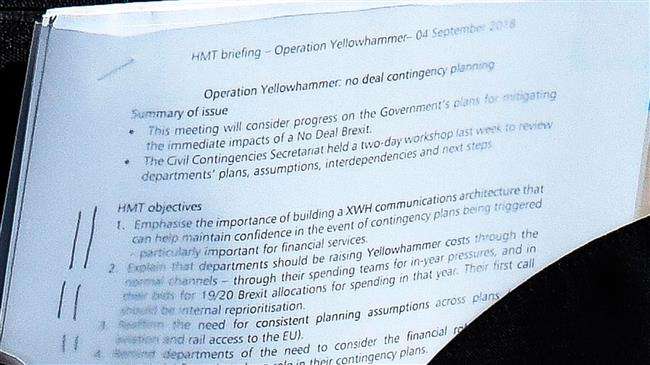The document – snapped as it was carried into a Whitehall meeting – also reveals that Philip Hammond’s department has codenamed its contingency planning “Operation Yellowhammer”.
It warns that government departments will have to make cuts to prepare for crashing out of the EU, saying: “Their first call should be internal reprioritisation.”
And it acknowledges the need to “maintain confidence in the event of contingency plans being triggered – particularly important for financial services”.
Operation Yellowhammer is being overseen by the Civil Contingencies Secretariat, which is usually responsible for coping with emergencies such as floods and disease outbreaks.
The document was photographed just hours after the health secretary admitted that taxpayers would have to foot the bill for stockpiling NHS medicines in a no-deal Brexit.
A Treasury spokesman refused to be drawn on the paper, saying: “We don't comment on leaked documents.”
The yellowhammer is a bird with a bright yellow head, a brown back streaked with black and chestnut rump, often seen perched on top of a hedge or bush, singing.
Intriguingly for critics of a no-deal Brexit, its song is said to have a rhythm like “a little bit of bread and no cheese”.
There were suggestions that John Glen – a Treasury minister – rather than a civil servant, had been carrying the document when it was snapped.
Only half of one page has been photographed and only some of the words can be made out.
It states that the Civil Contingencies Secretariat “held a two-day workshop last week to review departments’ plan, assumptions, interdependencies and next steps”
The Treasury’s “objectives” are listed as effective “communications architecture” to ensure confidence is maintained if Britain crashes out of the EU.
There will be a need to “explain that departments should be raising Yellowhammer costs through the normal channels – through their spending terms for in-year pressures, and in their bids for 19/20 Brexit allocations for spending in that year”, adding: “Their first call should be internal reprioritisation”.
It then refers to “the need for consistent planning assumptions” in a sentence that moves on to “rail access to the EU”.
The Treasury will also “remind departments of the need to consider the financial.....commercial firms that play a role in their contingency plans”.
Owen Smith, a Labour supporter of the anti-Brexit Best for Britain campaign, said: “Operation Yellowhammer is the latest proof that Brexit will be a colossal act of economic self harm for the country. It's the political equivalent of dismembering yourself.”
And Ben Bradshaw, who backs the People’s Vote campaign, said: “We now know the government is preparing for Brexit in the same way they’d approach catastrophes like flooding, a disease outbreak or a terrorist attack. This is not what anyone voted for in 2016.”
Read the original article on the Independent.
More about: Brexit
















































